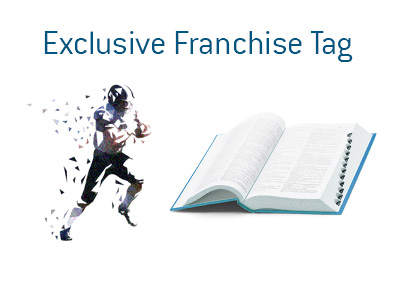Definition of Exclusive Franchise Tag
What is the exclusive franchise tag when it comes to the NFL? What is the definition of the term "exclusive franchise tag"?
The Collective Bargaining Agreement between the NFL's owners and players allows each of the NFL's 32 teams to "tag" one of their players each season with a one-year tender offer.
There are three different types of tags - the exclusive franchise tag, the non-exclusive franchise tag and the transition tag.
 The "exclusive franchise tag" is reserved for the league's best players and isn't used that often. A non-exclusive franchise tag allows players to negotiate with other teams, and if the original team decides not to match an offer from another team, they will receive two first-round picks from the signing team.
The "exclusive franchise tag" is reserved for the league's best players and isn't used that often. A non-exclusive franchise tag allows players to negotiate with other teams, and if the original team decides not to match an offer from another team, they will receive two first-round picks from the signing team. In the case of a superstar quarterback, the team will not want to risk losing him for two first-round picks, which is where the "exclusive franchise tag" comes in.
With the exclusive tag, teams don't have to worry about the players negotiating with another team, though the compensation that they must pay the player if they tag him with the exclusive tag is higher. Players aren't able to negotiate with other teams if they receive the exclusive franchise tag.
A player with an exclusive franchise tag will get the average of the top five salaries at the player's position for the current year, or 120% of their previous salary, whichever is greater. Compare this to the non-exclusive franchise tag, where the player will get the top five salaries at the player's position for the past five years (average).
Players that have recently received the exclusive franchise tag include Le'Veon Bell and Kirk Cousins.
As soon as a player is tagged, their salaries become guaranteed for the upcoming season.
Players do not like being tagged, as they are looking for longer-term deals with guaranteed money. While their salaries are guaranteed if they are tagged, they are usually craving longer-term deals that come with security.
There is an incentive for teams that tag players to sign them to deals, as taking players consecutively for two or even three years gets very, very expensive for the teams. This is why you almost always see players sign longer term deals after they have been tagged for one year.
The case of Kirk Cousins was an interesting one, as the Redskins weren't completely committed to Cousins as their long-term quarterback, though he continued to put up numbers. The Redskins gave him a non-exclusive tag in the first year and then an exclusive franchise tag in the second. Tagging Cousins for a third straight year would have been extraordinarily expensive for the franchise, so they let him walk instead. In the end, the Redskins would have been better off just giving Cousins a long-term deal to start, as they ended up paying Cousins roughly $50 million in guaranteed money anyways.
--
Davemanuel.com Articles That Mention Exclusive Franchise Tag:
None
